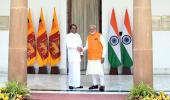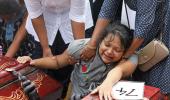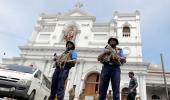The head of Colombo's Catholic church in Sri Lanka Cardinal Malcolm Ranjith has expressed dissatisfaction over the ongoing probe in the April 21 Easter Sunday bombings, saying it will "end up in nothing" like all the previous investigations.

His comments came amidst an infighting between the two factions of the ruling coalition over the abdication of responsibility to prevent the deadly attack despite the availability of prior intelligence.
Addressing a religious gathering at Akmeemana district on Sunday, the Cardinal said he was skeptical about the progress in the probe.
"We can't be satisfied about the investigations. Like all the previous investigations on many incidents in the past, this will also end up in nothing," he said.
Meanwhile, a three-member committee appointed to probe the attacks that killed 258 people, including 11 Indians, on Monday submitted its final report to President Maithripala Sirisena.
Supreme Court Justice Vijith Malalgoda, who headed the committee, handed over the report to President Sirisena. Other members of the committee - former ministerial secretary Padmasiri Jayamanne and former police chief N K Ilangakoon - were also present.
The details of the report were immediately not available.
Sirisena has taken a strong exception to Prime Minister Ranil Wickremesinghe's faction initiating a parliamentary probe.
The President has threatened to boycott Cabinet meetings if the parliamentary select committee process was not halted.
Sirisena said he would not cooperate with the parliamentary probe and would not allow defence or police officials to testify before the committee.
The government and assembly speaker Karu Jayasuriya have made it clear that the probe process would not be halted.
On Saturday, Sirisena sacked national intelligence chief Sisira Mendis who reportedly said that the attacks could have been avoided and that the president had failed to hold regular security meetings to assess the threats from the militants.
India had shared intelligence inputs with Sri Lanka about possible attacks weeks before the bombings.
Nine suicide bombers carried out a series of devastating blasts that tore through St Anthony's Church in Colombo, St Sebastian's Church in the western coastal town of Negombo and another church in the eastern town of Batticaloa, and three high-end hotels frequented by tourists in the country's deadliest violence since the devastating civil war with the Liberation Tigers of Tamil Eelam ended in 2009.
The Islamic State claimed the attacks, but the government blamed local Islamist extremist group National Thawheed Jamaath for the attacks.











 © 2025
© 2025